West Asheville lost cemetery site at a 'standstill.' What's next for the property?
ASHEVILLE - When human remains were found in June, as well as grave shafts and deteriorated parts of a wooden coffin, archeologist Tasha Benyshek walked away from the Haywood Road property with a clear recommendation: a retaining wall must be built to preserve the area in place.
It's been eight months. The West Asheville construction site is still an exposed raw field of red clay. Black filter fabric, worn now, covers the most vulnerable areas.
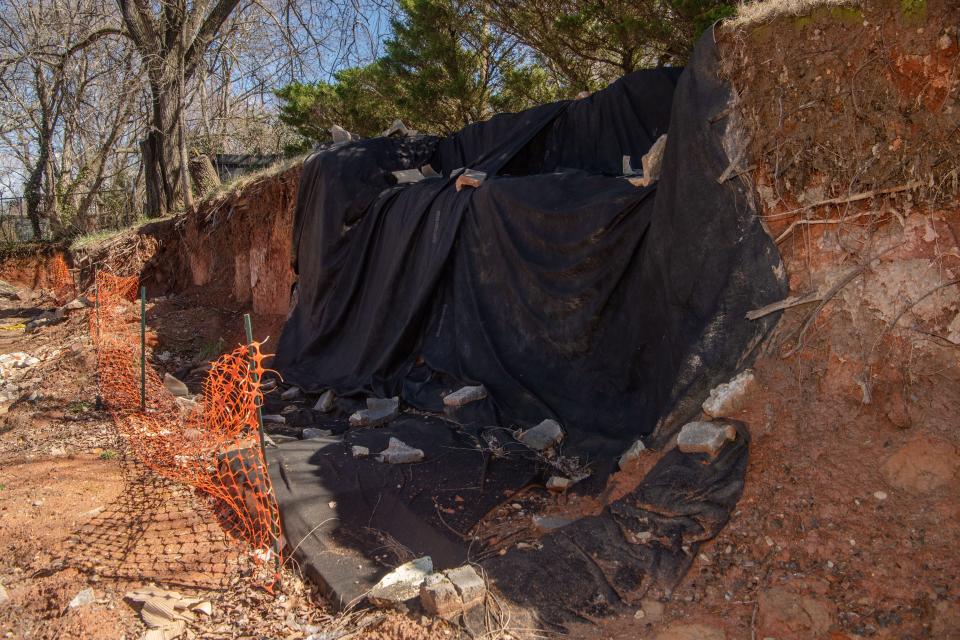
Permitting hurdles and refinancing for the property have slowed progress, property owner Imran Alam said. Meanwhile, the fate of the neighboring West Asheville Presbyterian Church, and the southern parking lot that backs the site where human remains were found, suspected to possibly contain more graves, is still unknown.
Benyshek said she was "dismayed" that it's taken this long to get a retaining wall in place — fearing threats to the site, like the freeze and thaw of winter, or vandalism.
“The longer it just sits like that, I’m obviously worried about it," she told the Citizen Times in February.
What's the history of the site?
The property at 680 Haywood Road, in the heart of busy West Asheville, is poised for development, but the June discovery of remains was no accident. Conda Painter, a third-generation local and curator of the West Asheville History Museum, flagged the possibility of a cemetery located there, bodies left behind.
The property is the historic location of Wilson's Chapel and cemetery, established there as early as 1883. The building was closed and moved in 1925 to 103 Burton St., now called Community Baptist Church.
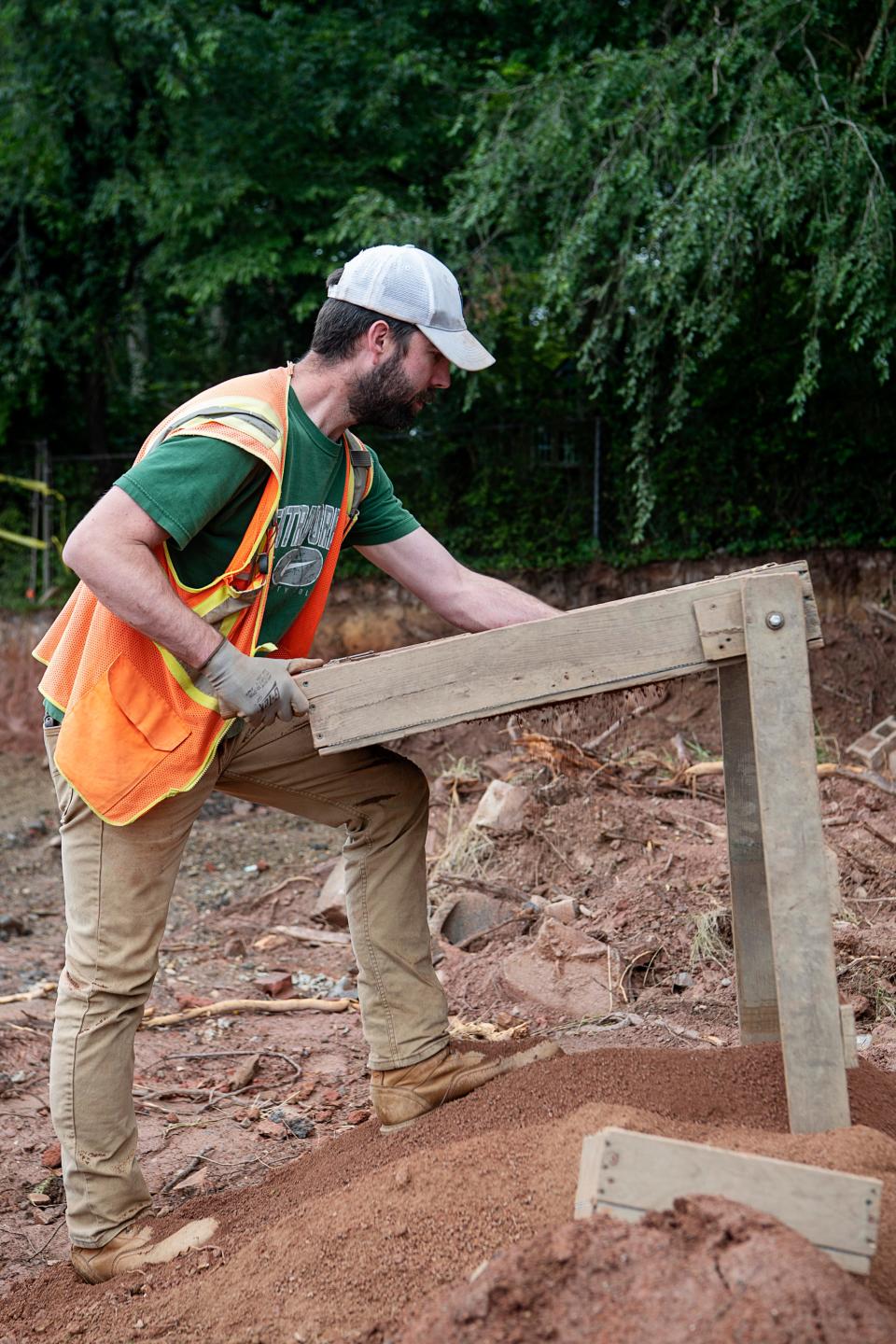
An African Methodist Episcopal church, Wilson's Chapel was historically Black, and formerly enslaved people are likely among those buried there. When the church was moved, the June discovery proved that an unknown number of people interred at the cemetery were not moved with it.
Alam brought Benyshek onto the project in 2021 after a "stop work order" was issued for pending construction due to the parcel's proximity to a possible archeological site.
Benyshek, senior archeologist for a private sector firm, Asheville-based TRC Environmental, was onsite for the month of June. After her investigation, she submitted a 72-page report in July to Alam, the city and the Office of State Archaeology.
Since then, the property has been left in a kind of limbo. Responsibility fell to the city and Alam to get the retaining wall up as quickly as possible, she said.
Development still a go?
When Alam first purchased the property nearly five years ago he had not heard about a cemetery until Painter approached during construction, a 2006 article in hand.
The property was slated for a new commercial building: two stories, with retail spaces, restaurants and a penthouse lounge. The southern area where graves were found was planned for parking. After the discovery, voicing enthusiasm for the preservation of the archeological area, Alam returned to the drawing board to redesign the project.
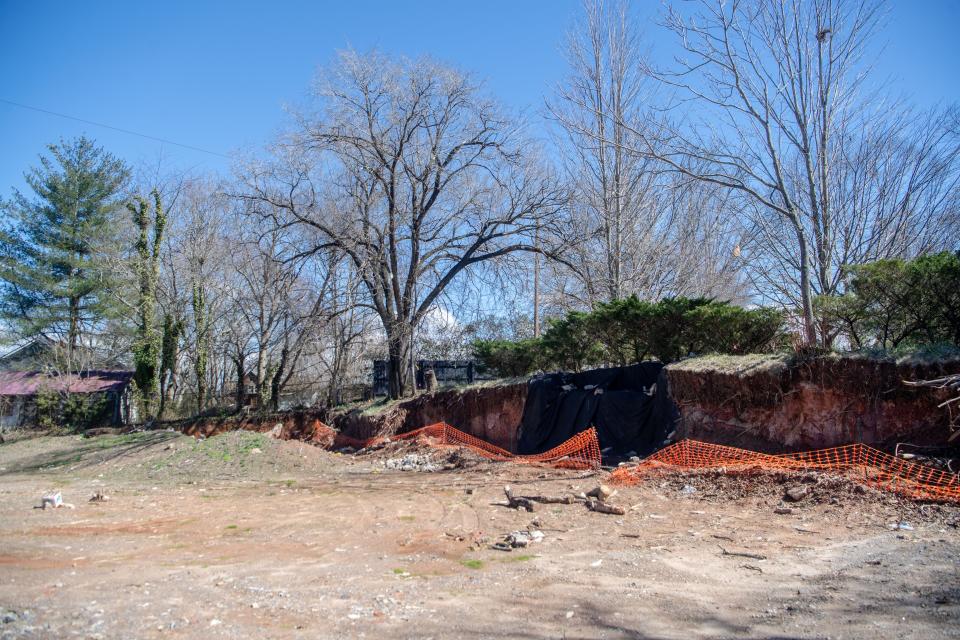
He told the Citizen Times in February that it had been a lengthy process, requiring significant revisions to the project's design. Plans are in the final stages of approval. He hoped construction would begin within a month. Once permitting is in place, he will have to return to the bank for a new loan approval, as his original loan has expired.
A permit filed in October with the city still included a two-story building, but also a 5-foot-tall, 150-foot-long retaining wall. Benyshek's report shows the wall stretching east-to-west across the entire parcel, cordoning off a small southernmost section of the property.
Mark Matheny, the city's director of development services, said in a Feb. 21 comment sent by city spokesperson Kim Miller that the design team made the "necessary adjustments" based around Benyshek's recommendation for a retaining wall.
"That design modification has been submitted and approved and the permit has been issued for construction," Matheny said in the emailed statement.
More of the story to tell
On the final pages of Benyshek's report, contained within the appendixes, is the only known photograph of Wilson's Chapel, unearthed by Painter years before, and a note from Painter describing her part in the cemetery's discovery.
It's a story about the neighborhood. About forgotten places. About Black gravesites and cemeteries, historically ignored and overlooked. It's a story about Painter and her dad.
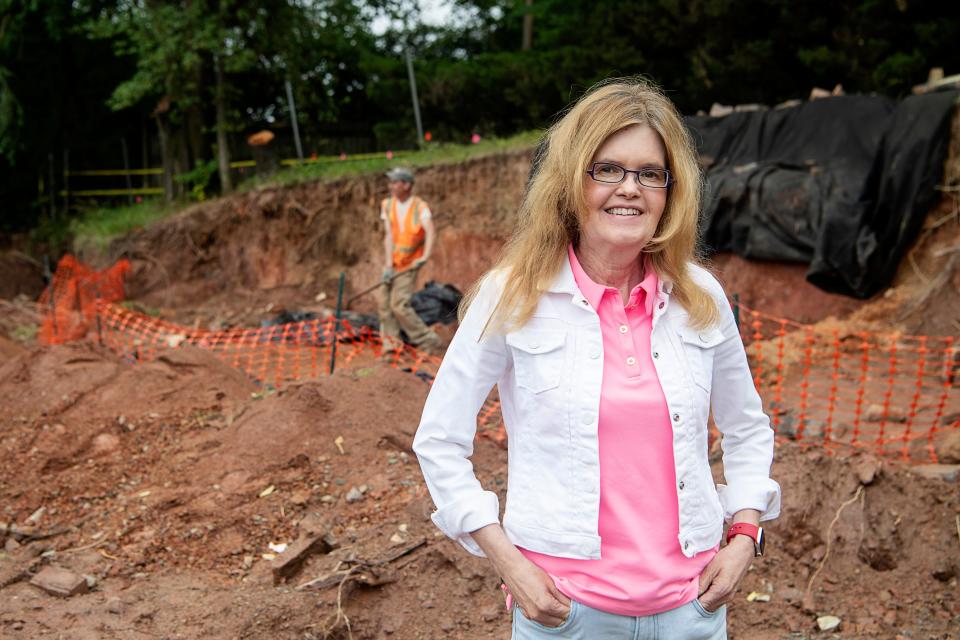
She grew up listening to her father and neighbors tell her stories about Haywood Road. "Porch stories," she called them. When she was young, growing up in the '70s, her father researched their West Asheville neighborhood. They heard rumors of a lost cemetery, nearly in her backyard.
“It’s taken until now for all this to surface," she told the Citizen Times in February. She added, later, that "now we have no excuse at all but to honor this significant piece of West Asheville history."
"This wouldn’t have been on anybody’s radar were it not for that neighborhood and Conda, through the years. That’s not just for historic cemeteries, that’s for everywhere," Benyshek said.
“Who knows the landscape better than the people who grew up there?"
Painter's hope is for a monument to honor the site and the people who were "laid to rest there."
"As I walk by the property now I experience a mix of feelings regarding last summer’s discovery of Wilson’s Chapel and the cemetery," she said. "While I am so greatly relieved that they have finally come to light, the entire corner is now at a complete standstill, including the West Asheville Presbyterian Church which owns the parking lot behind the graves."
"However, I also know without a doubt that all this has happened for a reason," she said.
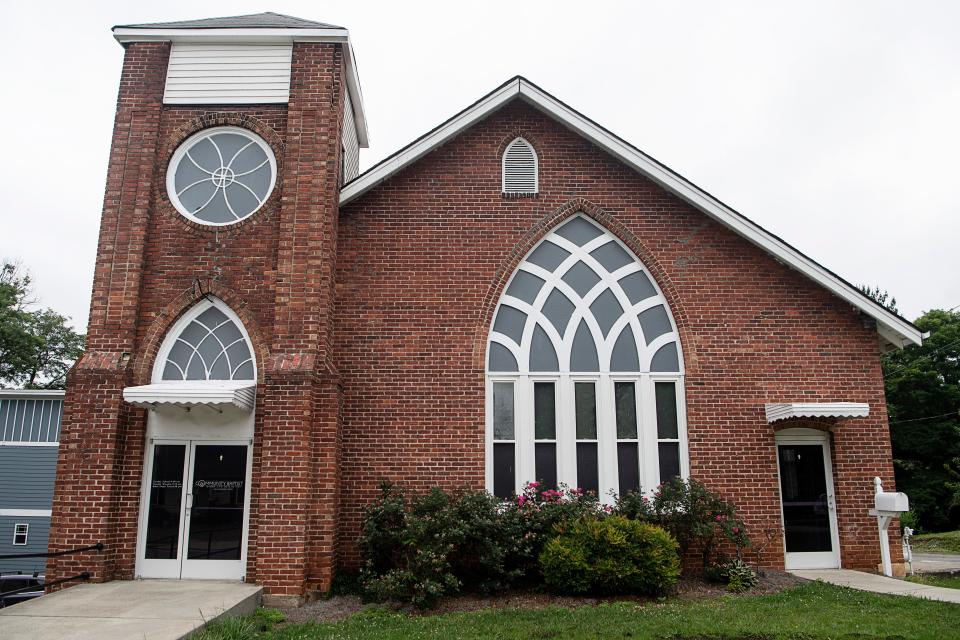
What about the Presbyterian church?
When the neighboring West Asheville Presbyterian Church dissolved its congregation, the church and its surrounding land — which includes the parking lot abutting the Haywood Road site — reverted back to the Presbytery of Western North Carolina, the regional governing body for the Presbyterian church.
The presbytery formed an administrative commission responsible for closing the West Asheville congregation and discerning what's next for the property.
Marcia Mount Shoop, pastor/head of staff with Grace Covenant Presbyterian Church, is co-chair of that commission. She told the Citizen Times March 7 that though the presbytery was made aware of the possibility graves were located beneath the parking lot through local media coverage, they hadn't been contacted directly. Mount Shoop said they would like to learn more.
"The commission is continuing to do the work of exploring community involved future use of the property ... we are in conversation with some particular community (organizations), but it's too early for us to discuss that," she said of the church itself.
Any future steps will have to be approved by the presbytery. While the commission had previously thought razing the property would be necessary, future partners may decide to repurpose the existing structure.

Next steps for former cemetery?
From her West Asheville History Museum on Haywood Road, Painter hosts walking tours throughout the neighborhood. Recently she and DeWayne Barton, founder of Hood Huggers International and president of West Asheville's Burton Street Community Association, briefly discussed collaborating on neighborhood tours.
Through Hood Huggers, Barton runs driving and walking tours highlighting the "past, present, and future of African Americans in Asheville."
Painter said collaboration would serve to bring more awareness to the story of Wilson's Chapel and those interred there. "It's really important to me that these people are remembered."
Barton told the Citizen Times March 7 that he was interested in getting involved because the story of the cemetery is "so tied to the neighborhood ... the work (Painter) did since she was a young girl, trying to educate people about what was there, was commendable. I want to work with somebody like that who has been committed for such a long time.
"It's no-brainer to connect (with Painter) and try to tell the stories of these historically African American spaces. That's what we do. That's why we started the Hood Tours," he said.
Painter said the empty lot is a reminder every time she walks by that the land is still waiting.
“It’s been my whole life," she said. "It's amazing how something like this has a way of becoming a big part of your life. It’s all unfolded through the years. And it’s like, here we are. Years later. Who would have thought?"
More: Digging deeper: Who was buried at a West Asheville lost cemetery?
More: Answer Woman: Will West Asheville Presbyterian Church on Haywood Road be torn down?
Sarah Honosky is the city government reporter for the Asheville Citizen Times, part of the USA TODAY Network. News Tips? Email shonosky@citizentimes.com or message on Twitter at @slhonosky. Please support local, daily journalism with a subscription to the Citizen Times.
This article originally appeared on Asheville Citizen Times: Lost cemetery in West Asheville: 8 months later, what comes next?

